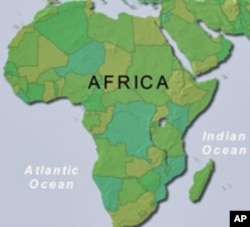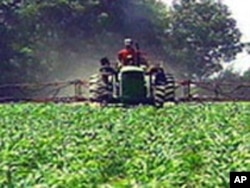U.S. agricultural aid to Africa in the past has concentrated on meeting emergency humanitarian needs. Now, say experts, it is focused more on reducing poverty and hunger over the long run.
The global food crisis affects Africa but did not originate there, says Ousmane Badiane, director for Africa at the International Food Policy Research Institute in Washington.
“It has nothing to do with changing weather patterns in Africa, neither draught, nor floods, nor civil strife. It originates from [the] changing relationship between overall supply at the global level and global demand.”
Soaring populations and rising incomes in countries like China, India, Brazil, Nigeria and others have pushed demand far ahead of supply over the last ten years or so. The imbalance, says Badiane, has pushed up global food prices. That’s good for African food exporters, he says.
On the other hand, the crisis has dampened the demand for agricultural goods, slowing the increase in food prices. And that’s good for African consumers.
But as prices for goods fall, so do export earnings. Governments earn less in tariffs and taxes and have less money to invest in local and regional agriculture.
Credit hard to come by
Another result of these crises is a shortage of credit in the global financial market, making it harder for African investors to buy equipment and supplies.
Tight money, says Badiane, “means high interest rates [and] stronger competition for the limited credit resources for African investors and entrepreneurs.”
The way to get out of the economic and food crises, he says, is to help farmers be more productive.
“When we talk about making African agriculture more productive, it’s not just for the production of food to eat, but [it’s also] for the generation of income, and wealth and assets in the largest pockets of poor people in the rural areas.”
Small farming, big impact
Modern techniques, Badiane says, will help small farmers produce more. For example, small-scale farmers will have much better access to banking services, supplies and processing and trading opportunities, all of which would help them gain access to larger national and international markets.
“The bottom line, however, is to have a stable, strategic framework – a framework for planning, a framework for implementation [to] make sure that you have continuity in the countries,” he says. “And that is a much bigger challenge…to get that happening.”
He stressed the importance of having a consistent program.
“The problem Africa had…is that there were just too many [programs] around from outside and from within, changing the framework for growth and development in Africa.... It was impossible to focus, to plan, to measure, to track, to invest and to realign countries we’re [working with]. “
Now we have a chance and an opportunity to change that, says Badiane.
“A few years ago the African Union adopted an Africa-wide collective framework, the Comprehensive Africa Agriculture Development Program (CAADP) which is being implemented under the leadership of the New Partnership for Africa’s Development (NEPAD).”
The challenge now, says the IFPRI specialist, is to get the international community to understand the importance of working closely with African governments and getting their leaders involved.
Too often, he says, international agencies tend to give up on a specific program if they see a weakness here or there. He says the only effective way is to continue with a good program, such as the Comprehensive Africa Agriculture Development Program, over the next five to ten years, even if there are flaws.
Sometimes well-meaning NGOs and others wind up focusing more on their own priorities than on helping others. For example, an NGO may advise continuing a program when it’s not really that useful anymore but gives the NGO a reason to continue its work.
Africa’s economy on its way up
Some see Africa as being in constant need of help, but in fact, says Badiane, economic growth there is up.
“Africa is in the middle of the strongest economic recovery of its history. A growing number of African countries have been growing by six percent almost, since the late 90s – over a 10-year period.”
Productivity levels -- although much lower than the world average – are rising in Africa, he says, while they are slowing in the rest of the world, putting Africa in a better position to compete. He says the international community must take this into account in planning for Africa’s future economic gain.
“This is not the time for NGOs and international development agencies to cry foul and run to the old and the same failed programs…of trying to patch here and patch there little tiny things.
This is the time to be consistent, to be bold, to build on the recent recovery in Africa and support the collective strategic framework that African countries are trying to put in place…and there are plenty of opportunities there,” he says.
The real way to help Africa, says Badiane, is for stakeholders to join with African leaders in implementing a plan based on strategies that have worked in the past. The experience gained from doing this, he says, will help develop Africa’s economy over the next five to ten years.













